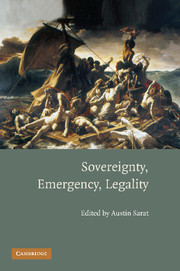Book contents
- Frontmatter
- Contents
- Contributors
- Acknowledgments
- Introduction: Toward New Conceptions of the Relationship of Law and Sovereignty under Conditions of Emergency
- 1 The “Organic Law” of Ex Parte Milligan
- Comment on Chapter 1: David Dyzenhaus, “The ‘Organic Law’ of Ex Parte Milligan”
- 2 Emergency, Legality, Sovereignty: Birmingham, 1963
- Comment on Chapter 2: “Order” in the Court
- 3 The Banality of Emergency: On the Time and Space of “Political Necessity”
- Comment on Chapter 3: Emergencies, Body Parts and Price Gouging
- 4 The Racial Sovereign
- Comment on Chapter 4: Toward a Nonracial Sovereign
- 5 Should Constitutional Democracies Redefine Emergencies and the Legal Regimes Suitable for Them?
- Comment on Chapter 5
- Index
1 - The “Organic Law” of Ex Parte Milligan
Published online by Cambridge University Press: 07 May 2010
- Frontmatter
- Contents
- Contributors
- Acknowledgments
- Introduction: Toward New Conceptions of the Relationship of Law and Sovereignty under Conditions of Emergency
- 1 The “Organic Law” of Ex Parte Milligan
- Comment on Chapter 1: David Dyzenhaus, “The ‘Organic Law’ of Ex Parte Milligan”
- 2 Emergency, Legality, Sovereignty: Birmingham, 1963
- Comment on Chapter 2: “Order” in the Court
- 3 The Banality of Emergency: On the Time and Space of “Political Necessity”
- Comment on Chapter 3: Emergencies, Body Parts and Price Gouging
- 4 The Racial Sovereign
- Comment on Chapter 4: Toward a Nonracial Sovereign
- 5 Should Constitutional Democracies Redefine Emergencies and the Legal Regimes Suitable for Them?
- Comment on Chapter 5
- Index
Summary
Introduction
In 1866 the Supreme Court of the United States of America decided Ex Parte Milligan, a landmark constitutional decision on the question of the relationship between sovereignty, emergency, and legality. The Supreme Court decided, against the wishes of President Lincoln and his Secretary of War, that military tribunals established by executive proclamation may not try civilians as long as the ordinary courts are open. In addition, the majority held that the constitutional prohibition on the executive extended to Congress.
In 1885 Albert Venn Dicey, Vinerian Professor of English Law at the University of Oxford, published the first edition of his great book, An Introduction to the Study of the Law of the Constitution. In this and subsequent editions, Dicey grappled with the same themes. More precisely, the issue for Dicey, as for the Supreme Court, was the relationship between sovereignty, martial law, and the fundamental commitment of a constitutional order to the rule of law. Dicey said, echoing the Supreme Court some twenty years before: “‘Martial law’ in the proper sense of that term, in which it means the suspension of ordinary law and the temporary government of a country or parts of it by military tribunals, is unknown to the law of England.” This, in his view, was “unmistakable proof of the permanent supremacy of the law under our constitution.”
- Type
- Chapter
- Information
- Sovereignty, Emergency, Legality , pp. 16 - 57Publisher: Cambridge University PressPrint publication year: 2010
- 3
- Cited by

